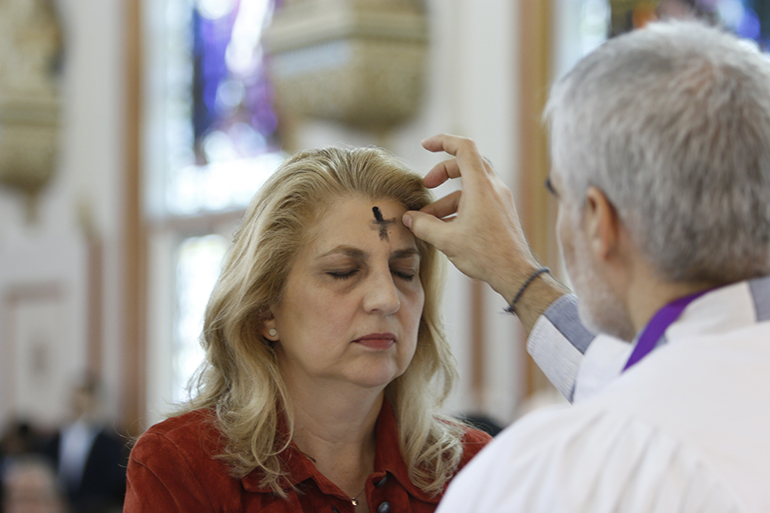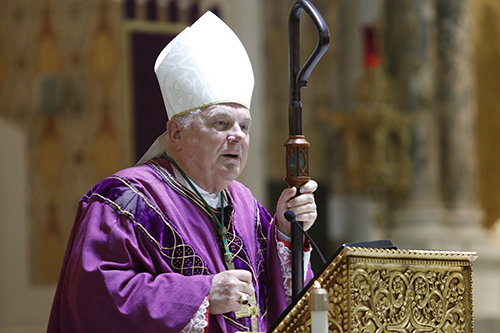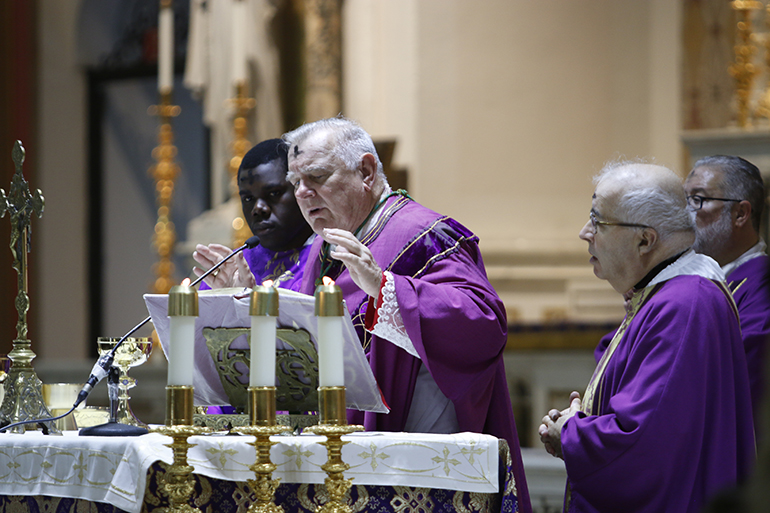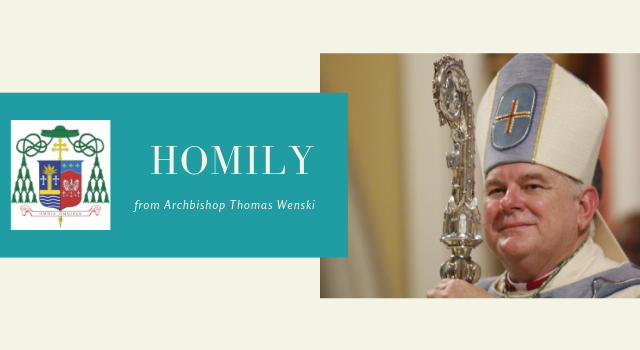By Archbishop Thomas Wenski - The Archdiocese of Miami

Photographer: ANA RODRIGUEZ-SOTO | FC
An extraordinary minister imposes ashes on the faithful during the celebration of Ash Wednesday Mass at Gesu Church in downtown Miami, March 6, 2019. Archbishop Thomas Wenski celebrated the Mass.
Archbishop Thomas Wenski preached this homily during Ash Wednesday Mass, March 6, 2019, at Gesu Church in Miami.
Today our Mass began without the customary penitential rite in which we are invited to call to mind our sins before we celebrate the Sacred Mysteries of the Mass. Its omission is a way of drawing attention to the fact that this whole season of Lent that begins today is a “calling to mind of our sins” so that we might more worthily celebrate the Easter mysteries of our Lord’s suffering, death and resurrection.
In today’s second reading, St. Paul exhorts us: “We are ambassadors for Christ, as if God were appealing through us. We implore you on behalf of Christ, be reconciled to God.” Be reconciled to God! St. Paul’s plea is for a personal reconciliation – but, speaking as an ambassador for Christ, he is also exhorting us to be reconciled, as he said, “through us,” that is through the representatives of the Church.
Lent is a season of grace and salvation. And therefore, it is “the favorable time” for each Catholic to rediscover once again the Sacrament of Penance.

Photographer: ANA RODRIGUEZ-SOTO | FC
Archbishop Thomas Wenski preaches the homily while celebrating Ash Wednesday Mass at Gesu Church in downtown Miami, March 6, 2019.
The Sacrament of Penance remains “the ordinary way of obtaining forgiveness and the remission of serious sins committed after Baptism.” And since Lent is designed with the Renewal of Baptismal Promises in mind, a good confession should be a part of every Catholic’s Lenten observance. Through this sacrament, we can rediscover Christ as the one in whom God shows us his compassionate heart and “reconciles us fully with himself.”
I remember in 1983, the Pope John Paul II visited Haiti and there, speaking truth to power – in front of that nation’s dictator – he said: Things must change here. 36 years later, one could argue that nothing much has changed; for in order for things to change anywhere, we must change. We can complain about our family life, our careers, our parish, the state of our world. But Lent reminds us in its call to conversion that the world we live in cannot be helped in any other way than by our repentance. And for this repentance, Jesus gives us three effective means: almsgiving, prayer and fasting.
Now this penance and fasting is not just about external actions but rather an internal attitude. “Rend your hearts not your garments,” the prophet tells us. Our Lenten practices are not about trying to manipulate God, like the child who holds his breath until he gets his way with his parent. And, while Jesus does not want us to hide our light under a bushel basket, the point he wants us to understand is that all that we do should be to the greater glory of God. He is rather severe in his judgment of those who use religion just to draw attention to themselves.
Early in the first millennium of Christianity, one of the Ancient Fathers of the Faith, St. John Chrysostom wrote: “I tell you it is possible to fast without fasting. Is this a riddle? By enjoying food, while having no taste for sin, that is a better kind of fasting.” In other words, as Christians we are first obliged to fast from sin. There is no point in missing dinner and then spending the evening destroying your neighbor with gossip. “Starve your sins, not just your stomach.” If we remember this then the spiritual works of Lent – more intensive prayer, fasting and other works of self-denial that traditionally is put under the rubric of almsgiving – can help us as we address those contradictions in our lives that keep us from seeking the holiness to which we have been called in Baptism.
Today, we begin our Lenten journey – a journey that leads us again to the conversion of our minds and hearts symbolized by our Renewal of Baptismal Promises on Easter Sunday. As we begin, we receive the ashes as a sign of our willingness to embrace the true way of life presented to us in the Gospels. And when we receive the ashes, we hear again the words with which Jesus began his public life: “Repent and be faithful to the Gospel.” (cf. the Gospel according to St. Mark)

Photographer: ANA RODRIGUEZ-SOTO | FC
Archbishop Thomas Wenski celebrates Ash Wednesday Mass at Gesu Church in downtown Miami, March 6, 2019.

